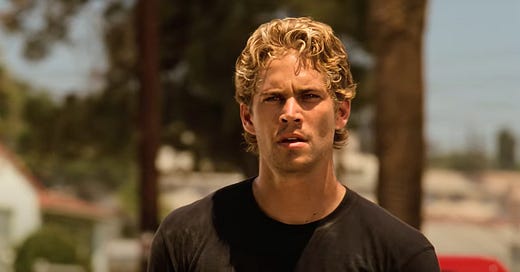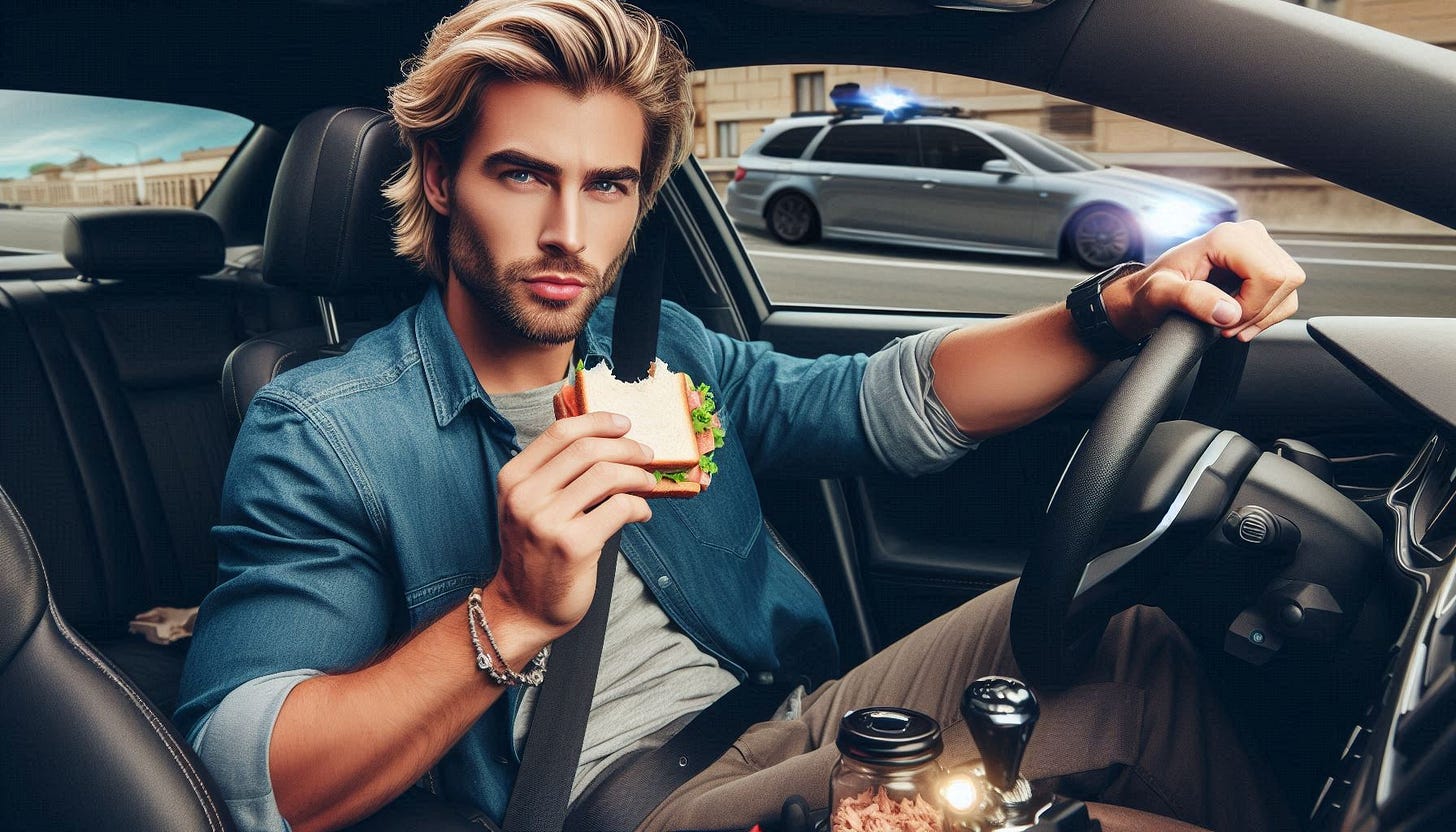In which I show my age by saying that I don’t like working from home, do like eating my lunch alone, would find it stressful to be a spy, think the first Fast and Furious film is the best, and remember the Betterware catalogue.
—
Five years on from the beginning of the pandemic, the topic of working from home remains a lukewarm culture war topic, periodically reheated every time some ancient business leader rears their head in the media to offer some thoughts about why things should definitely go back to the way they were in the old days.1
As someone who spent the better part of 3 hours per day on the train, for 5 days a week, over the course of around 10 years, I’d have difficulty arguing that full-time commuting is anything other than a gigantic waste of time and emotional energy, but I also found working from home every day to be pretty stressful and depressing, too.
A bit of distance between your place of work and where you live, rather than having the two permanently sharing the same space — your private space — is something I have personally found to be beneficial.
Plus, if I was using my own distant experience of entering the workforce as a guide (which arguably, like those other old men, I should not), finding a way to work alone without leaving the house was the kind of thing I was Googling in 2002 instead of actually researching and applying for jobs.2 As long as I didn’t have to go anywhere or talk to anyone, I was happy to do anything, I thought.
Offices are frequently, and perhaps fairly, lampooned as being a hotbed of lame jokes, compulsory team-building activities and awful Christmas parties. But, at the risk of sounding like an old git, my early experiences of office work brought me out of myself in a way that doing some computer-based job from home never could.
That was a long time ago, however, and one thing that’s definitely changed in the intervening years is how accustomed people have become to being alone, even in public.
I’m not sure at what point I stopped feeling self-conscious about going for a meal, or a drink, on my own, but these days it doesn’t bother me in the slightest. And, for all that I quite like going to the office and seeing people in real life, I’m also fond of an occasional trip out for a solo lunch. In fact, doing so even makes me feel slightly mysterious — like a spy, or something.
Recently I was watching an episode of Slow Horses, during which the main protagonist River Cartwright, posing as a journalist, checks into a room in a village pub, and observed to my wife that I would very much like to be able to do what he was doing, apart from the dangerous business of actually being a spy and having to work undercover.
‘Well, that’s just going to a hotel on your own, isn’t it?’ she replied. ‘You’re basically fantasising about being a sales rep.’3
Anyway, I can’t remember the exact plot developments, but I don’t think River gets immediately rumbled at the pub, or if he does, it’s because he’s sort of a crap spy (that’s kind of the whole point of the show) who looks a bit sweaty and suspect even when under only moderate pressure,4 and not because he’s there alone.
This reminded me of The Fast and the Furious, released in 2001 — when eating solo was much more suspicious5 — and the actions of another extremely crap undercover operative, Paul Walker’s Brian O’Connor, whose behaviour raises questions when he tries to access Vin Diesel’s street-racer gang by going to the café that acts as a front for their shady activities every day and ordering the same tuna sandwich.6
It’s been said before, but this film (1 Fast 1 Furious) basically has exactly the same plot as Point Break, right down to the conceit that there would ever be a need for a good-looking young agent to infiltrate a gang because there was something about a particular youth culture interest that made its members perfect, uncatchable criminals.7
They also share a weird lack of tension about whether the main bad boy ever really believes that his new buddy is a cop or not, with the developing bromantic feelings between them overriding a mountain of evidence that suggests this new friend is not to be trusted at all.
As a franchise, which is somehow still going, there have been plenty of spectacular moments over the years, from the low-key excitement of losing, and then re-gaining, the participation of major cast members,8 to increasingly outlandish car-based set pieces.
But, to me, the section of the first film during which Brian O’Connor gets into a fight because he ordered a tuna sandwich is still the most memorable of the whole series. Has tuna ever been mentioned so often, and with such seriousness, anywhere else in cinematic history?
To summarise: Brian asks how the tuna is, the girl behind the bar responds that he should know that it’s ‘crappy’ because he’s been coming in every day and ordering it, and then he goes ahead and orders it again, with a smirk.
Vin Diesel’s crew arrive, en masse, including Jesse (the nerdy kid who’s always opening his laptop and going on about fuel intake valves) and Vince (the bearded and dislikeable tough guy who is later seen displaying his alpha status by playing an electric guitar at a party while wearing a string vest) and immediately voice their suspicions: ‘What is this guy, sandwich crazy?’
(The insinuation is that Brian is not really interested in tuna sandwiches at all, but in the girl behind the bar, Mia, who just happens to be the sister of Vin Diesel’s character.)
The skirmish that inevitably follows is sparked by Brian — after leaving with a recommendation from Vince, laced with a homophobic slur, that he should find an alternative lunching spot — insisting: ‘I like the tuna here’.
To which the response is — and this is the line — ‘BULLSHIT, ASSHOLE! NO-ONE LIKES THE TUNA HERE!’9
This is pretty early on in the film, and even though Vin’s crew are immediately suspicious when a very good-looking man10 keeps turning up at their place on his own and ordering a tuna sandwich, he is continually offered new opportunities to wriggle out of the situation.
Still, it all seems rather stressful: Brian may be very good-looking, but he’s not a particularly great liar, and you also wouldn’t fancy him in a fight with Vin, which makes his decision to try and romance his sister, as well as infiltrate his street racing gang as an undercover cop, even more baffling.
It wouldn’t be for me, either: not the clandestine police work, nor the trying to flirt with someone at a bar, and certainly not the getting into a fight with an angry man.
The sitting alone and ordering food bit, though, I could do, happily. If I order a crappy tuna sandwich and eat it alone while staring enigmatically into space, no questions will be asked of me.
After all, I’m not trying to gain access to a street racing gang, or any other kind of gang: when I’m finished, I’ll go home, or back to the office, my mission completed for another day. If my dream really is to have a meal on my own, because it feels slightly dangerous (even though it isn’t), then I’m living that dream on a regular basis.
Stuart Rose, formerly of M&S and Asda, was one recent example, although I did enjoy the not-so-subtle dragging he received in passing by The Guardian, which noted, ‘A short biography of him on Asda’s website says: “Stuart appears to have no hobbies apart from work and has a dog called Bruce.”’
I’m pretty sure the only results related to becoming a rep for Betterware, whose promotional materials that promised a bright future ‘working for yourself from home and earning £££’ were arguably the ‘10 secrets of Instagram success’ of the day.
But not for Betterware, where you earn £££ from the comfort of your own home, working for yourself! (Yes, I do know they’ve gone bust, and of course spent valuable writing time looking through their Wikipedia page for further details.)
River, played by Jack Lowden, is my sort of hero, in that he’s kind of handsome and cool, but also frequently makes a prat of himself in a way that causes him genuine professional embarrassment.
And Betterware were thriving!
Is having the same sandwich every day also suspicious behaviour? Not if you’re me. Or Dominic Raab (allegedly).
Surfers make great bank robbers, and street racers are really good at stealing DVD players, apparently.
I think I feel the same way about the Fast and Furious series as I do about Marvel movies, in that about 15 years ago the idea of long-running franchises gaining big stars as they progressed, rather than losing them, seemed rather novel. But there then came a point, in terms of actually watching the films, where that novelty wore off.
I’ve been accidentally misquoting this as ‘No-one likes the tuna here, asshole!’ for years, which I like to believe is how most other people remember it, too.
‘He’s beautiful…’ says Jesse, at one point, and it’s hard to disagree.





